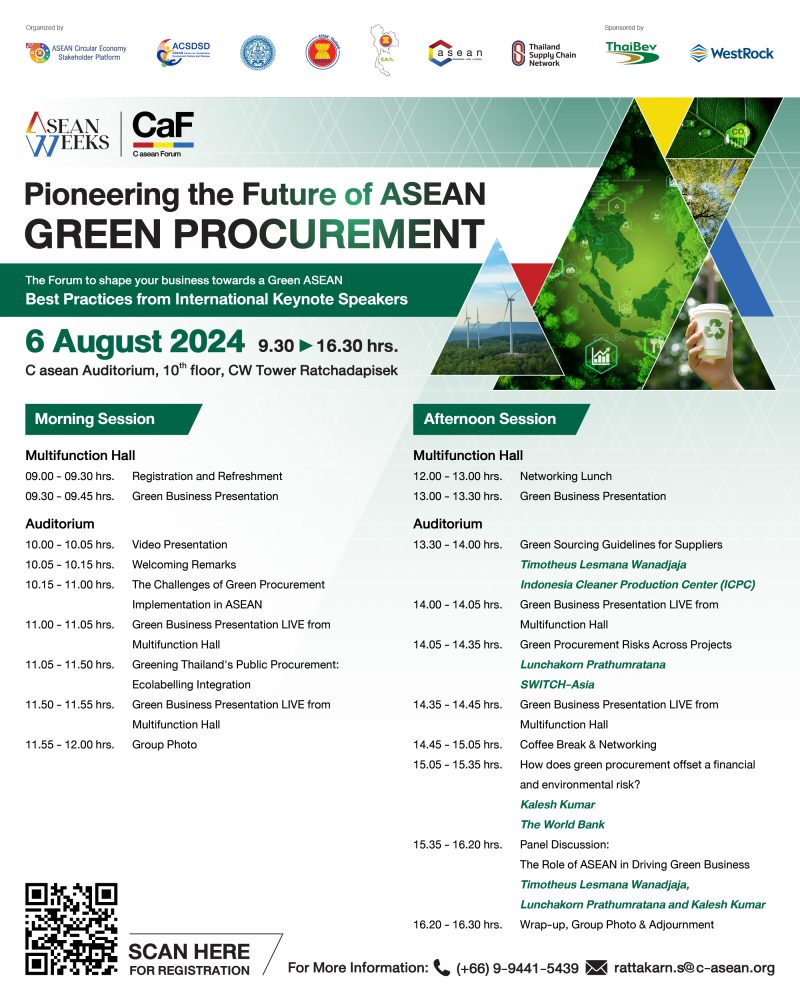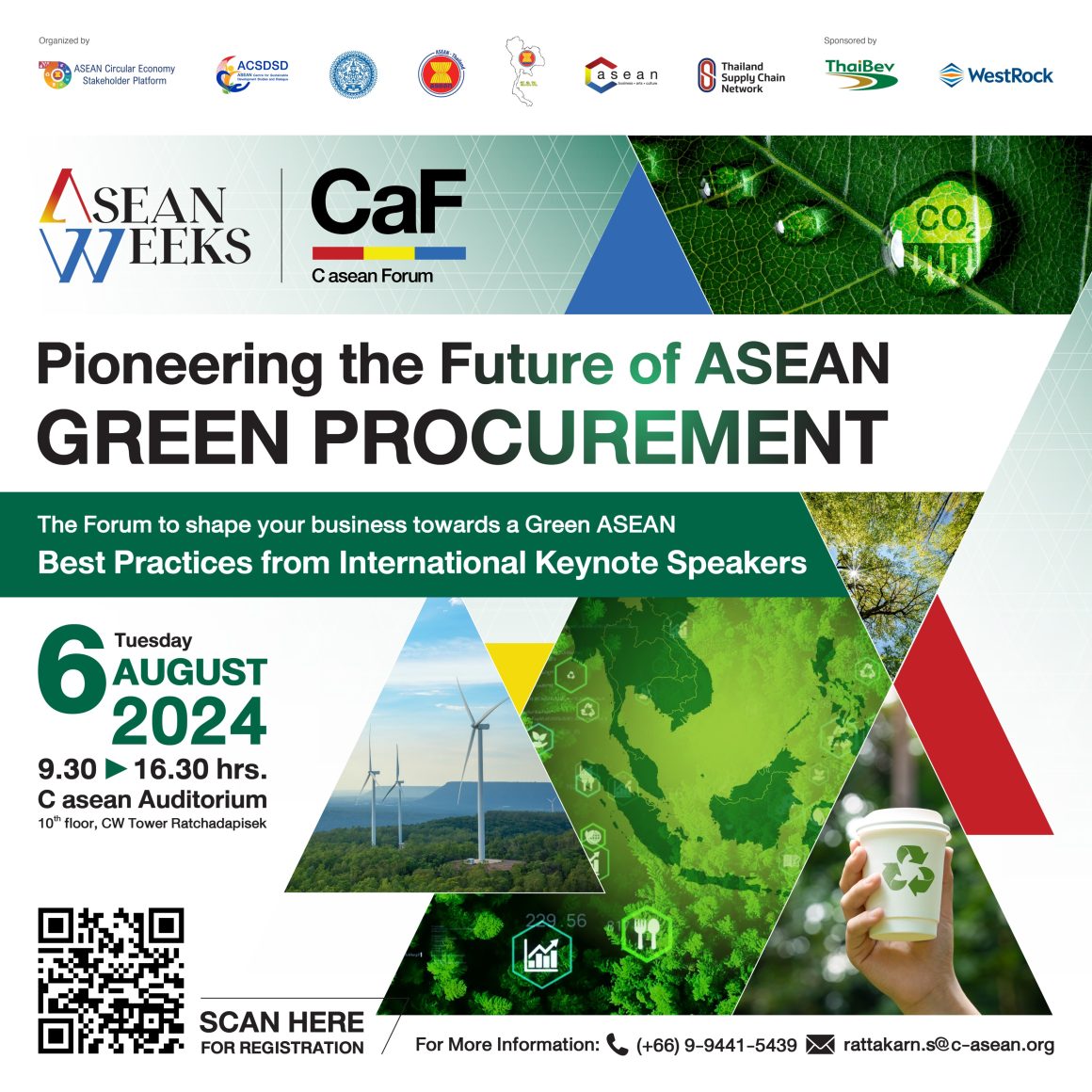The ASEAN Circular Economy Stakeholder Platform (ACESP) at the ASEAN Centre for Sustainable Development Studies and Dialogue (ACSDSD), the C asean, Thailand Supply Chain Network and partners are excited to invite you to the upcoming “ C asean Forum – Pioneering the Future of ASEAN Green Procurement”| 6th August 2024 |9:30 – 16:30 hrs. | C asean Auditorium, 10th floor, CW Tower, Ratchadapisek Road, Bangkok. This forum aims to pioneer the future of sustainable procurement in ASEAN, fostering collaboration and partnerships to overcome challenges and realise the transformative potential of Green Procurement. This forum is a collaborative effort organised by the ASEAN Centre for Sustainable Development Studies and Dialogue (ACSDSD), the C asean and Thailand Supply Chain Network. Its primary objective is facilitating knowledge sharing, innovative practice discussions, and business matching activities, enhancing Green Procurement implementation in ASEAN.
The “C asean Forum – Pioneering the Future of ASEAN Green Procurement” aims to gather key stakeholders, including government officials, industry leaders, SMEs, and international experts, to discuss and advance Green Procurement across the ASEAN region. With an estimated opportunity of USD 11 trillion, Green Procurement is a critical tool for leveraging market disruption through strategic purchasing power, driving demand for sustainable products, and fostering the Circular Economy (CE).
Green Public Procurement has evolved over the past two decades into a system innovation and multi-stakeholder tool. This evolution necessitates collaborative efforts to formulate guidelines defining “sustainable products and services.” It also encourages the private sector to reinvent procurement systems and invest in research and development, providing supplies that adhere to these guidelines. The fundamental link between GPP and the circular economy is rooted in their shared objective of addressing the triple planetary crisis—climate change, biodiversity loss, and pollution—while promoting Sustainable Consumption and Production (SCP). Integrating GPP into government procurement policies can accelerate the decarbonisation of critical sectors such as construction and transportation, representing significant portions of greenhouse gas emissions and government procurement expenditures. For instance, the construction sector alone accounts for 12% of government procurement emissions, with the public sector purchasing 40%-60% of concrete. This translates to 20%-30% of revenues in the construction industry, highlighting the transformative potential of GPP in achieving climate and environmental goals.
In recent years, ASEAN Member States (AMS) such as Thailand, Malaysia, Singapore, Cambodia, Vietnam, Lao PDR, Indonesia, and the Philippines have incorporated GPP into their national strategies. The inclusion of GPP in the ASEAN Sustainable Consumption and Production Framework emphasises key actions like efficient raw material use, minimising chemical use, waste, and emissions, and promoting the sustainable transition of SMEs through capacity building. Despite these positive developments, challenges such as the absence of standardised guidelines, limited capacity and resources, inadequate infrastructure and supplies, diverse cultural and socio-economic contexts, and market competitiveness still need to improve the effective implementation and advancement of GPP in the region.
Adopting Green Procurement practices allows businesses to reduce their environmental impact by selecting suppliers that adhere to environmental standards and promote the use of eco-friendly materials. This commitment to sustainability enhances brand reputation, appealing to environmentally conscious consumers and providing a competitive edge in the market. Through strategic purchasing decisions, businesses can drive market demand for sustainable products, encouraging suppliers to innovate and improve their environmental performance. Additionally, Green Procurement helps businesses comply with environmental regulations, reducing the risk of legal penalties and enhancing overall compliance. Investing in sustainable practices also leads to long-term cost savings through improved resource efficiency, waste reduction, and energy conservation.
The forum’s agenda facilitates knowledge sharing, innovative practice discussions, and business matching activities, enhancing Green Procurement implementation in ASEAN. Keynote presentations and panel discussions will feature international and ASEAN speakers providing insights into Green Market Development, procurement system reforms, eco-labels, and GPP standards in the ASEAN Economic Community (AEC). The forum will also feature business matching rounds and exhibitor presentations, fostering opportunities for collaboration and networking among participants.
By integrating insights from international and regional experts, this forum aims to pioneer the future of sustainable procurement in ASEAN, fostering collaboration and partnerships to overcome challenges and realise the transformative potential of Green Public Procurement.



